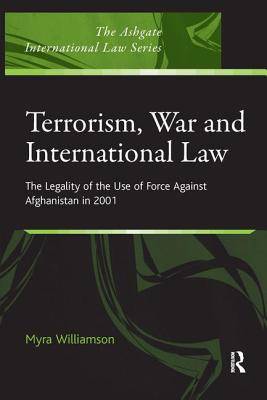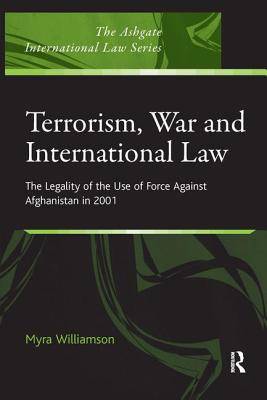
- Afhalen na 1 uur in een winkel met voorraad
- Gratis thuislevering in België vanaf € 30
- Ruim aanbod met 7 miljoen producten
- Afhalen na 1 uur in een winkel met voorraad
- Gratis thuislevering in België vanaf € 30
- Ruim aanbod met 7 miljoen producten
Zoeken
Terrorism, War and International Law
The Legality of the Use of Force Against Afghanistan in 2001
Myra Williamson
€ 290,45
+ 580 punten
Uitvoering
Omschrijving
This book analyzes the legality of the use of force by the US, the UK and their NATO allies against Afghanistan in 2001. The work challenges the main ground for resorting to force, namely, self-defence under Article 51 of the United Nations' Charter, by examining each element of Article 51 that ought to have been satisfied in order to legitimise the use of force. It also examines the wider context, including comparable Security Council resolutions in historic situations as well as modern instances where force has been used, such as against Iraq in 2003 and against Lebanon in 2006. As well as making the case against the legality of the use of force, the book addresses wider questions such as the meaning of 'terrorism' in international law, the changing nature of conflict in the twentieth and twenty-first centuries including the impact of non-state actors and an overview of terrorism trends as well as the evolution of limitations on the resort to force from the League of Nations through to 2001. The book concludes with some insight into the possible future implications for the use of force by states, particularly when force is purportedly justified on the grounds of self-defence.
Specificaties
Betrokkenen
- Auteur(s):
- Uitgeverij:
Inhoud
- Aantal bladzijden:
- 294
- Taal:
- Engels
- Reeks:
Eigenschappen
- Productcode (EAN):
- 9780754674030
- Verschijningsdatum:
- 20/05/2009
- Uitvoering:
- Hardcover
- Formaat:
- Genaaid
- Afmetingen:
- 156 mm x 234 mm
- Gewicht:
- 589 g

Alleen bij Standaard Boekhandel
+ 580 punten op je klantenkaart van Standaard Boekhandel
Beoordelingen
We publiceren alleen reviews die voldoen aan de voorwaarden voor reviews. Bekijk onze voorwaarden voor reviews.











